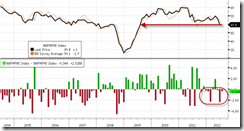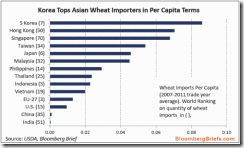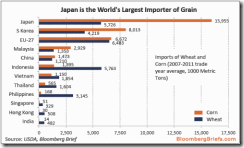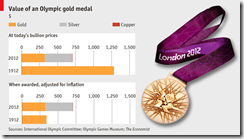The US Federal Reserve’s supposed transparency has only been exposing their string of serial forecasting blemishes.
Evan Solitas has been tracking the Fed’s performance and observed, (bold emphasis mine)
The Bernanke Fed has made a significant effort since June 2009, when the NBER judges the recession to have ended, to increase transparency by providing guidance about future policy and macroeconomic forecasts. What is striking, however, is how this transparency has not prevented in the slightest the intellectual dishonesty in ignoring its failure to meet its own goals.
A disparaging but not unfair comparison would be to little orphan Annie. "The sun'll come out tomorrow," Annie sang. "Bet your bottom dollar that tomorrow there'll be sun." The 3-to-4 percent recovery growth we've been long promising will come out tomorrow, the FOMC basically says every quarterly meeting. Bet your bottom dollar that tomorrow there'll be lower unemployment.
The Fed must love tomorrow. Because, as they say, it's always a day away.
What I mean by this is the Fed makes projections, misses them by miles and consistently in the wrong direction, and then doesn't own up to it. They just push back their forecast. The forecasts are not inappropriately optimistic, either -- it's just that the Fed's actions have fallen short, and that there is zero accountability to target the forecast.
Their transparency, however, allows us to demonstrate thoroughly the extent of this failure.
Their fundamental error: the haughty assumptions that human action can be aggregated into mathematical expressions similar to natural sciences or positivism.
Reason and experience show us that there are two separate realms: the external world of physical, chemical, and physiological phenomena, and the internal world, in our minds, of our thoughts, feelings, valuations, and purposes in life. There is no bridge connecting these two spheres. They are not connected automatically. We always have the right to choose our actions. Identical external events often produce different human reactions, and different external events sometimes produce identical human actions. We do not know why.
So, the science of human action is different from the physical sciences. We cannot experiment with human beings except in a physiological, medical, or biological sense. In the realm of ideas, we cannot experiment as we can in the physical sciences. We cannot duplicate situations in which all things are maintained the same as before. We cannot change one condition and always get the same consequences. We cannot experiment with human actions, because the world, its population, its knowledge, its resources are all constantly changing and cannot be held still.
In economics we must use our minds to deduce our conclusions. We have to say, Other things being equal, other things being the same, this change will produce such and such an effect. We have to trace in our minds the inevitable results of contemplated changes. We are dealing with changeable human beings. We cannot perform actual experiments, because the human conditions cannot be duplicated, controlled, or completely manipulated in real life like chemical experiments in a laboratory. Therefore, there are great differences between economics and the physical sciences. We cannot experiment and we cannot measure. There are no constants with which to measure the actions and the forces which determine the actions and the choices of men. In order to measure you must have a constant standard, and there is no constant standard for measuring the minds, the values, or the ideas of men.
More, Federal Reserve (central bank) 'experts' are unlikely to produce unorthodox or radical or ‘out of the box’ thinking as they are supposed to uphold the institutions that employ them, thus the “zero accountability”. It's not about being right or wrong but what needs to broached by such institutions.
Bluntly put, their studies are basically designed to rationalize or justify the existence of their institutions. You may call this biased analysis. Also the conflict of interests between politicized money and the citizenry highlights the agency problem or the principal agent dilemma.
And such outlook applies to almost all political and politically affiliated institutions.
Why is this important? Because the Fed or central bank policies or centrally planned monetary actions have essentially been derived from their analysis or outlook.
And analysis with consistently large deviance from economic reality would only translate to high probability that their accompanying actions would have negative implications or consequences than the intended or expected goals or objectives.
Policy errors, thus, are likely to be the rule than the exception.
In short, we shouldn’t trust central bankers. We don’t even need them.
Thus, prudent investors need to anticipate of such centrally planned monetary misdiagnosis-malpractice, and take appropriate action to protect or insure themselves from their adverse effects.
Don’t forget half of every transactions we make has been coursed through political (fiat legal tender based) money. And distortions of the economics of money through interventions only extrapolates to parallel disruptions in the production or economic structure. This is why boom bust cycles and hyperinflation exists.











